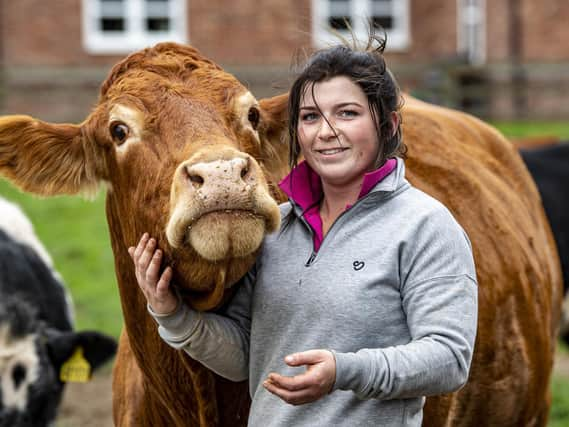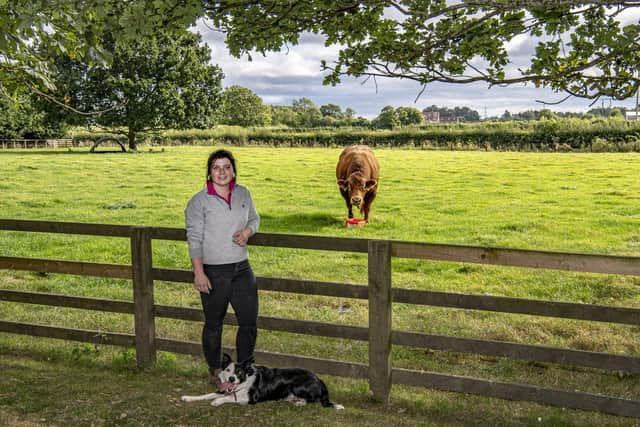Farm of the Week: Meet the young cattlewoman who gave up an apprenticeship to go her own way in North Yorkshire


Hannah Donaldson farms at Hampshire House, Huby, where she has a herd of continental crossbred suckler cows including Limousin-cross-Belgian Blues, Belgian Blue-cross-Limousins and Blues out of dairy-bred cattle.
Hannah said she and her sister, Katrina, have always enjoyed showing stock that has not been bought at what she terms 'silly money'.
Advertisement
Hide AdAdvertisement
Hide Ad“It’s a bit of fun for us. When you can just go into the sheds and pick out a good one it’s great. We’ve done well in recent times and we are looking forward to Agri Expo at Carlisle.”


Hannah said that she was always destined to farm in her own right, following her parents, Roger and Carol, who farm next door at Hazel House.
“I just love cows. I started with my own when I was 15. Farming was just bred into me. I’m so glad I used to work on the farm when I came home from school. I wouldn’t be where I am without Mum and Dad.
“When I started I remember sitting down with our vet and putting together a herd plan. My dream at the time was to get to 50 cows. I now have 120.
Advertisement
Hide AdAdvertisement
Hide Ad“They are my passion and since I’m with them all day, every day I know them all individually and they all have a name. One of my most precious cows is Rufus who won her class at the Great Yorkshire Show, but my favourite has to be Soft Cow who is now 12 years old.”
Hannah said she rents 130 acres in various locations around Easingwold and a little further afield at Oulston.
“I’ve expanded gradually and I’m now probably at my limit. I doubled my acreage overnight when I took on an additional 70 acres all around Easingwold last November. Having increased the herd I was running short of grass. It is now on a five-year rental agreement.
“The worrying part with renting land is knowing how much to put into it, but I try to have five-year rolling lets. I spend all day driving around my various fields as they are dotted around everywhere, including some hilly land at Oulston.”
Advertisement
Hide AdAdvertisement
Hide AdHannah said her herd calves in two periods during spring and autumn. “I use natural service and have Limousin and Belgian Blue bulls and choose which cows to put them to having taken into account which click best.
“Around 80 cows will calve from March 1 for nine weeks and the cows and new calves will go straight out to grass. The cows will then stay out dependent on weather through the winter and only come in again for calving. They and their calves move on to Dad’s maize stubble and silage in winter. I wean the calves off in November and December and put the calves inside.
“The sandy land of my dad’s stubble fields really helps as it means I don’t have to house the cows and it also means they are a lot better healthwise.
“I will keep the heifers I consider special enough to go into the herd as replacements, but I mainly buy in replacement heifers out of Carlisle. I used to buy cows with calves at foot and in-calf again out of Thirsk and then it got to the stage when I started buying younger heifers that I ran on through the winter and then bulled them.
Advertisement
Hide AdAdvertisement
Hide Ad“Autumn calving is from August to October for the rest of the herd and anything that doesn’t hold in-calf in spring I also add to the autumn group.”
Hannah said that the business end of her cows’ progeny starts with her bulls going at between 14-16 months.
“I sell most of my stock at Northallerton livestock market with some going to ABP York. The heifers I turn back out to grass for a second summer before they go as smart little butchers’ heifers that the market is demanding.
“I took five heifers last week and they averaged 311p per kilo which is very good. I remember topping the market last year at 268p per kilo and thinking that was good.”
But Hannah also knows only too well how prices can turn.
Advertisement
Hide AdAdvertisement
Hide Ad“At the moment it’s making it all worthwhile, but some years you can get £200 less per animal. That can make a huge difference, even though you are largely doing the same thing with the same or increased costs."
While most of Hannah’s cows are commercial crossbreds she has a few pedigree registered Limousins. Hannah has no plans to turn her herd fully pedigree, but she is enjoying having the ones she has.
Hannah had started an apprenticeship in agriculture at Askham Bryan College after leaving school but switched to an NDA at Bishop Burton College. Hannah said her dad was instrumental in her change of plan.
“The apprenticeship included working from home but then I found I was missing out and that everybody was having a great time at college. It was dad who told me to go and enjoy the experience.
Advertisement
Hide AdAdvertisement
Hide Ad“As I’d started with my cows when I was 15 dad looked after them during my two years at Bishop Burton. The herd ran to about 20 cows at the time.”
Hannah said her cattle showing mentors have been her sister Katrina and popular commercial cattle man David Hall of Rillington Fields.
“I used to go to shows with Dave. We bought beasts together and we have shown together. He and Katrina are the two who have helped me most. I don’t get chance to get to the local shows much at the moment as I’m that busy on the farm and I couldn’t go to the Great Yorkshire Show this year. That week in Harrogate is usually my one annual holiday.”
Hannah said some only see the successes in the ring, but there is far more happening behind the scenes.
Advertisement
Hide AdAdvertisement
Hide Ad“Those times are nice but it’s not all smiles and fun and games. It’s not always easy running a farm. There are plenty of tears and lots of work that goes into everything. But I’m not complaining. It’s what I always wanted.”